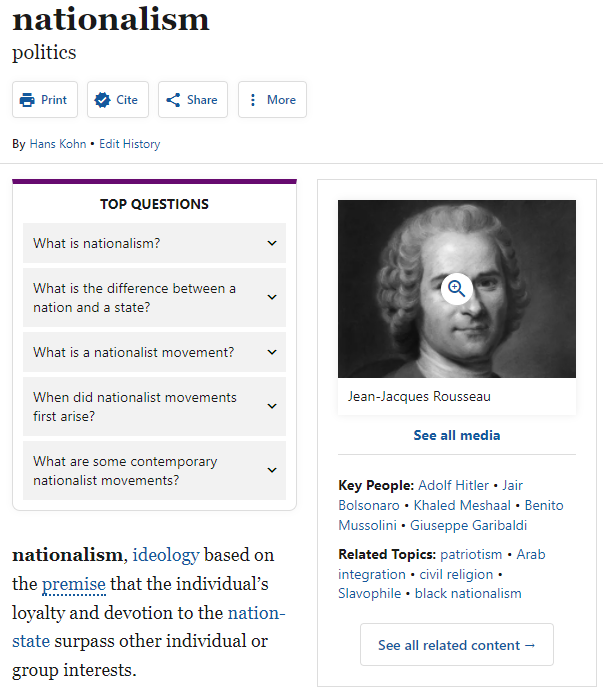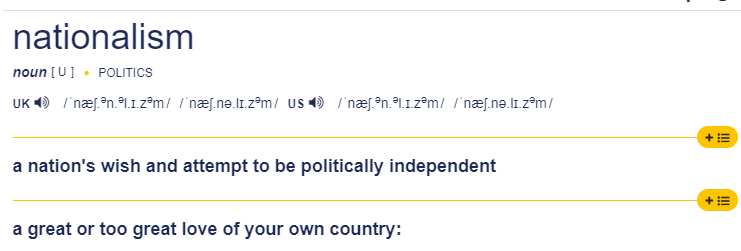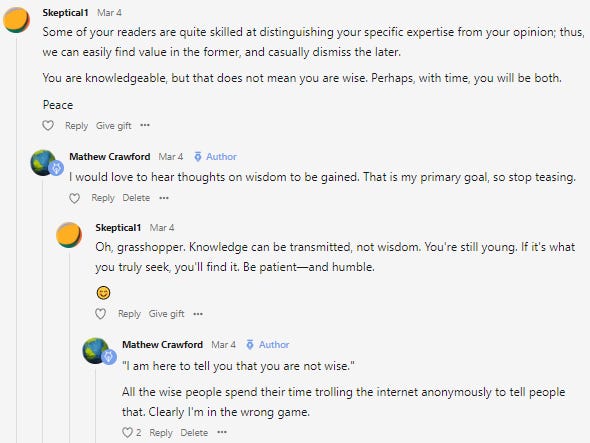The Wisdom of Getting Language Right
The Information Wars Part XI
"Humor is the good natured side of truth." -Mark Twain
I guess I'm going to discuss nationalism. Except that, as with many words, there are many versions of it.
Let's start with the very Woke Merriam-Webster:
Meh. Too biased. If a definition does not allow for better self-definition by the people it describes, it's a pejorative. Somebody who feels pride for their nation, and so is willing to bleed and die for their nation, doesn't necessarily do so out of a sense of superiority. They might feel, for instance, that a nation is a community of communities, and trust the ideals of that larger community set. They may or may not trust a further level of community to hold stable those values, and that is simply a matter of judgment, which we are all free to have.
It is perfectly normal for somebody to have the greatest loyalty toward their family and beloved friends, an affection for their community, and a relative trust in the strangers in other communities who have a shared value set. The real difference is in the building of that trust from the bottom-up, rather than it being imposed from the top-down, at which point that trust is not really trust, but fear. And fear of defection in one's own community or nation, such as that which results from imposed "legal" prisoner's dilemmas, obliterates free cooperation.
The Britannica version fails along a different vector.
To begin by classifying nationalism as an ideology leaps over the game theory that binds a community lovelingly, asserting that adherence to the nation can only be done for the sake of some defined set of principles at which the nation is at the top. This discards all those who love and adhere to their nation most all of the time, but whose first duty is to their conception of the brilliance of God (or Yahweh/Allah/universe/truth/other name you might use to denote the summary).
The Cambridge definitions strike me as more reasonable than the two prior.
The first definition is simple and straight-forward. The second describes the word used with a connotation of making the mistake of formulating love of the nation into an ideology. A lot of words are like this—the plain version and the one with a connotation that we've all seen before that is a recognizable personality flaw or false meditation (or at excess, brainwashing). But in such cases, we should generally default to the definition that lacks the value-judgment tacked onto it. To do otherwise falsely defines away perfectly reasonable people. And that's something many media have been doing at a greater and greater pace these past few years. And if you disagree with me on that account, that makes you an anti-vaxxer, according to the 2023 Merriam-Webster's edition.
The War is About Truth and Liberty First, and Nations Second
I was motivated to share these thoughts about words after an odd exchange on a recent post here at RTE.
I wasn't really sure what to make of somebody dropping by to say, "You are not wise," without further commentary.
Don't get me wrong, the path to wisdom feels like looking at a road that stretches miles into the distance, walking a few miles, and then coming to grips with how much longer it now looks. I'm like most people: a failure in many ways, looking for new handles to grasp onto to climb where the road goes vertical. I won't hold myself up as a paragon of wisdom, but I'm happy on the road and I'm happy to have company on the journey. Oh, and I like to write about a few slices of it. I sometimes understand myself better when I do.
I poked a little fun at the notion of an anonymous stranger going about telling people that they aren't wise, vacuous of any specific point.
I guess poking fun was not wise, and demonstrated an inability to hold or communicate complex ideas. The reply went on:
My so-called "pejorative" use of the term "jingoism" (which is a pejorative, by any definition you'll find) was mentioned as something I hoped that I would not find, and did not. Here is the way I put it:
I'd like to mention that I'd never watched Tommy's Podcast (TPC) before this airing. And while I'm generally wary of people who podcast with a background that is one overt display of jingoism, Tommy struck me as one of the most intelligent interviewers I've seen or heard in the podcasting world. I interpret him as "values first, flag second," which is the correct ordering of priorities, IMHO. I can see why he wound up being a point of convergence for several brilliant and busy minds. I've caught several of his interviewers since, and he has quickly moved into my short list of favorite podcasters.
Tommy's love of America seems perfectly rational to me. He shows a great deal of interest in thinking through ideas, a heart in his community, and the courage to stand up for values in order to make the community strong. He is exactly whom I'd like to see in front of the American flag. And for what it's worth, I greatly enjoyed talking with him and hope to do so again.
I also recently wrote about the important lessons about the value of institutions as professed by Douglass North. Does that not square with a desire for a strong and stable nation?
Edit: To be clear about my worries with respect to jingoism…the problem is when nationalism is ideological in a way that sways people into supporting immoral acts, such as offensive war against other peoples. I believe that portions of the American populace have been sold on some unjust military action at times. Nationalism that views other nations as [hopefully] good neighbors is, well, neighborly.
I was also told that I signaled contempt for Trump. That's a complex topic that will take a few pages to explain. It's certainly not based on a lack of love for his supporters, and I know many of them. In fact, I was willing to lose friends to defend them against what I felt was a dehumanizing assault by the media and Woke zombies. But I have a much clearer and cleaner view of those who support Trump on a political level than I do of Trump himself. That is to say that I am left hypothesizing about who he really is in this age of Reality TV politics. Again, that's a complex topic for another day.
As for populism, I am all about self-governance. I prefer self-governance within a community, and I think that within a healthy community, it should be rare that somebody needs to vote with their feet as an individual. So, in that respect, I think that self-governance generally harmonizes with healthy community governance. We're social animals after all.
In regards to technocracy, you can read what I have to say here about asymmetric technological development/governance:
Thankfully, the anon here hedges, and whether or not I feel that they have read me fairly or completely on a couple of issues, shows good will at the close.
And, as I close, I am thankful that I was spurred to give a take on a word like "nationalism", and to put it in its proper place—particularly given that we are assaulted daily by a media that seems sociopathically bent on selling us a corrupted lens through which to view our community of communities. The constantly pejorative labeling of those who love America has been unfair, unkind, and far worse if we don't deconstruct it.
In particular, we stand helpless while the right of nations to self-manifest is negotiated within the framework of a small (by economic standards, meaning easy to bribe and control) NGO of dubious ideological leadership, and with every perverse incentive imaginable in self-declaring the emergency that would grant it special powers over the Constitution (and other constitutions). That is a war on both truth and liberty at once. And should it fail or prove to be one more distraction from the real plans of extra-legal world governance, we seem to be under constant assault by the attempts.
So, let's continue to have these conversations. Dialogue is a prerequisite to getting closer to a reasonable shared truth as a community.










One of my favorite talks on this subject was given by George Friedman:
https://www.youtube.com/watch?v=eovIYNFopgw
To me, the war on nationalism is the war on democracy in that it's the war on the entitlement to everyone's stake in their nation-state.
This is why I'm against open door immigration. The new owner is being given a stake in a nation built by my family and ancestors and expected to be passed on to my heirs. They assume all the assets and liabilities of the state and the public goods and are able to collectivise and elect a leader that represents their interests. That's why in London we now have Sadiq Khan and it's unlikely he'll leave unless he's replaced by another Muslim. But pressed on the issues and metrics of a successful society there are few that would argue he's a successful Mayor.
But more than this there's an obvious ploy to atomise Western societies to an individual level and impose a universal and unquestionable morality. Proponents often try to claim that all societies are bound by the Golden Rule, but even that is stretched to its limits so they just call you a racist if you point out the obvious differences. Only the West's colonial history (not the Mongols or the Turks for example) is seen as bad and worthy of perpetual guilt.
In doing so we've completely lost faith in the basis of capitalism which was the West's finest export (it seems to me to be the only basis for the hegemony of our financial system, for example). There used to be a lively debate between the works of Max Weber and Karl Marx over the correct philosophy of history. Weber argued that while the different societies of the world share some superficial similarities, they are fundamentally different in their values and belief systems. Reading the Protestant Ethic and the Spirit of Capitalism today we can see how much our current society has lost its belief in it. Marx's argument was Historical Materialism, which even though it was tried by animals from Mao to Stalin, looks like it's still the prevailing philosophy because we won't stand up for what made our system work.
It's just a shame that it's so easy for our modern globalist media to discount any discussion on the basis that it comes from a place of bigotry rather than principle.
"I know well that the greater and more beautiful the work is, the more terrible will be the storms that rage against it."
–St. Faustina